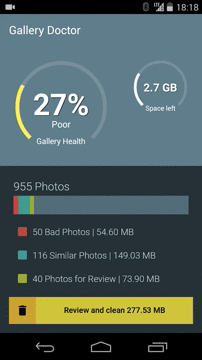Israeli photo-management startup MyRoll is launching a new standalone app today, one that identifies all your bad or duplicate photos so you can free up storage on your device.
Available for Android initially, with an iOS incarnation to follow, Gallery Doctor scans your camera roll and pulls out ones it thinks are blurry, have bad lighting, or are essentially duplicates of other images. It’s kind of like Cleen or Flic for iPhone, except Gallery Doctor removes much of the manual labor from the process by letting you remove all your “bad” photos with a single tap.
 The problem Gallery Doctor is trying to solve will likely resonate with anyone who takes lots of photos on their phone: an accumulation of snaps spanning multiple events, possibly spanning many years. The app quietly peruses your device and then separates all the photos into “Similar” and “Bad.”
The problem Gallery Doctor is trying to solve will likely resonate with anyone who takes lots of photos on their phone: an accumulation of snaps spanning multiple events, possibly spanning many years. The app quietly peruses your device and then separates all the photos into “Similar” and “Bad.”
If you don’t entirely trust the app to curate your handiwork, you don’t have to hit the big delete button — you can click through and work with the Tinder-esque interface that lets you swipe right to keep a photo, or left to dump it.
Based on our tests, Gallery Doctor’s ability to separate the wheat from the chaff was pretty impressive, though I didn’t agree 100 percent with everything it deemed to be “bad.”
Moreover, with the Tinder-like swiping feature, Gallery Doctor bears more than a passing resemblance to the aforementioned Flic and Cleen, which perhaps partly explains why it’s launching on Android first — neither Flic nor Cleen have found their way past iOS yet.
The story so far
MyRoll was originally known as Flayvr, before the Tel Aviv-based firm raised $2 million in funding last year and pivoted to become an intelligent gallery app that surfaces all your best photos and videos, automatically sorting them into “sharable moments.” Now that the company is looking to shine a light on all your bad photos, this feels like a natural progression.
Needless to say, Gallery Doctor uses MyRoll’s machine learning gallery curation engine, so it already has a ton of experience in identifying what’s “good” and what’s “bad.” It analyzes photo quality based on things like sharpness, color, and lighting, while it promises to get smarter over time — the more you use Gallery Doctor, the more it learns about your personal taste in photos.
“We think of MyRoll and Gallery Doctor as yin and yang — MyRoll helps users discover their important photos amongst the clutter of their photo galleries, while Gallery Doctor helps to get rid of that clutter and free up space for more important memories,” CEO and cofounder Ron Levy told VentureBeat.
It’s also worth noting that MyRoll recently introduced compatibility with Android Wear smartwatches, letting users manage their gallery from their wrists — Levy says the usage on that platform has been “phenomenal.”
Based on the two apps now launched from the company’s vaults, there’s little question the company places as much focus on functionality as it does design and aesthetics. Both MyRoll and Gallery Doctor are nicely designed and solve a genuine (first world!) problem. But how does this translate into a money-making business?
Making money
Often with these kinds of apps, the general idea runs something like this: build a solid product and large user-base, then worry about how to make cash later. That may have been partly the case with MyRoll initially, but plans are afoot to get the cash train moving.
While Levy doesn’t reveal specifics, he does allude to the inherent opportunities of “expanding the MyRoll technology into the cloud,” and replacing native gallery apps. Certainly, this may open the door to some interesting partnerships, as Levy said. This could mean a number of things, including deals with the major players in the cloud realm. But for me, another obvious conduit to monetization would be tie-ups with smartphone manufacturers to power the default gallery app on their devices.
Another obvious move would be to keep the existing apps free, but throw some new premium features into the mix which users buy in-app. This is something Levy says is being considered.
If I was a betting man, however, I’d perhaps put a few bucks on one of the tech titans coming along and buying MyRoll outright. We’ve already seen a slew of Israeli startups snapped up in recent times, including Onavo by Facebook, Waze by Google, SlickLogin by Google, and CloudOn by Dropbox. There’s definitely something in the air in Israel, and it wouldn’t surprise me at all if a big name came callin’ at MyRoll’s door.


